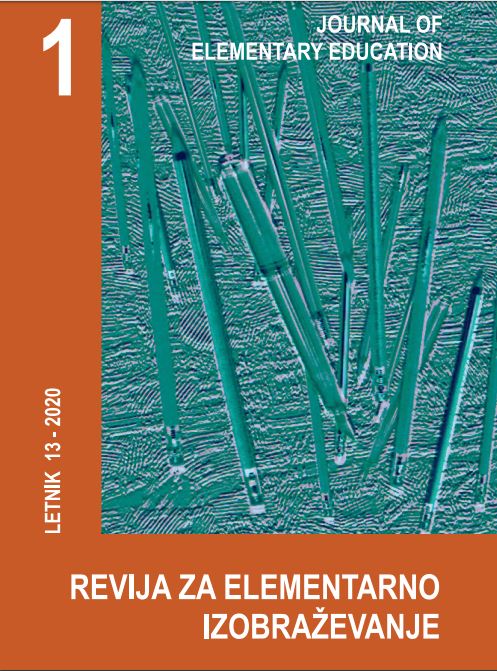Student perceptions of the importance of art content and activities in schools of general education and vocational schools in Croatia and Bosnia and Herzegovina
DOI:
https://doi.org/10.18690/rei.13.1.1-18.2020Keywords:
visual arts, general education, educational neuroscience, educational sciences, brain developmentAbstract
The aim of research was to examine how students in higher secondary education estimate the importance of visual arts subjects for the acquisition of general knowledge and the importance of visual arts for their future profession. The participants (N=605) were students in the third year of higher secondary education. Although the participants in the sample did not attach importance to visual arts for their future professions, they assessed that during their education, activities that necessitated working with their hands helped them in developing their memorization skills and the ability to learn other subjects.
Downloads
References
Armstrong, T. (2006). Višestruke inteligencije u razredu. Zagreb: Educa.
Arnold, M. (2009). Brain-based Learning and Teaching – Prinzipien und Elemente. In Neurodidaktik, Hrsg Ulrich Herrmann, Neurodidaktik (182-195). Weinheim und Basel: Beltz Verlag.
Baureis, H. (2015). Djeca bolje uče uz kineziologiju. Split: Harfa.
Brajčić, M. & Arnautović, D. (2007). Učenička evaluacija unutar predmeta likovne kulture. Napredak, 148(2), 258–266.
Brajčić, M. & Arnautović, D. (2002). Učenik aktivni subjekt u realizaciji i vrednovanju odgojnoobrazovnih ciljeva predmeta likovna kultura u osnovnoj školi. Školski vjesnik, 51 (1–2), 19–25.
Britton, L. (2000). Montessori učenje kroz igru. Zagreb: Hena com.
Caine, R.N., & Caine, G. (1991). Making Connections: Teaching and the human brain. Alexandria, VA: Association for Supervision and Curriculum Development.
Carlgren, F. (1991). Odgoj ka slobodi. Zagreb: Društvo za waldorfsku pedagogiju.
Dobrota, S.; Kuščević, D. & Burazer, M. (2010). Stavovi učenika četvrtih razreda osnovne škole o likovnoj kulturi i ocjenjivanju u nastavnom predmetu likovna kultura. Godišnjak Titus, 3(3), 215–227.
Drljača, D. M. (2018). Konstruktivistička nastava likovne kulture. Laktaši: Grafomark.
Duh, M. & Korošec, A. (2014). The development of art appreciation abilities of pupils in primary school. The New Educational Review, 36(2), 42–54.
Duh, M., Zupančič, T. & Čagran, B. (2014). Development of art appreciation in 11-14-year-old students. The International Journal of Art & Design Education, 33(2), 208–222., doi: 10.1111/j.1476-8070.2014.01768.x
Gardner, H. (1983). Frames of mind: the theory of multiple intelligences. New York: Basic Books.
Herzog, J. (2017). Monitoring the Artistic Development of Students in the Third Education Cycle of Primary School – Analysis of the Current Situation from a Gender Perspective (Spremljava likovnega razvoja učencev v tretjem vzgojnoizobraževalnem obdobju osnovne šole – analiza stanja z vidika spola). Revija za elementarno izobraževanje / Journal of Elementary Education. 10(4), pp. 349–364.
Huzjak, M. (2006). Darovitost, talent i kreativnost u odgojnom procesu. Odgojne znanosti, 8(1), 232–238.
Jensen, E. (2001). Arts with the Brain in Mind. Alexandria, VA: Association for Supervision and Curriculum Development.
Jensen, E. (2003). Super nastava (Super teaching). Zagreb: Educa.
Jensen, E. (2005). Poučavanje s mozgom na umu. Zagreb: Educa. (Teaching with the Brain in Mind. Association for Supervision and Curriculum Development. Alexandria, VA, 1998).
Lawrence, L. (2003). Čitanje i pisanje: Kako pomoći djetetu da nauči čitati i pisati. Zagreb: HENA COM.
Maras, N., Topolovčan, T. & Matijević, M. (2018). Konstruktivistička didaktika i neurodidaktika u diskursu reformne pedagogije: Teorijska polazišta, dileme i komparacija. Nova prisutnost, 16(3); 561–577.
Matijević, M., Drljača, M. & Topolovčan, T. (2016a). Učenička evaluacija nastave likovne kulture. Život i škola, 61(1), 179–193.
Matijević, M., Drljača, M. & Topolovčan, T. (2016b). Moje nastavne aktivnosti u nastavi likovne kulture. Učenje i nastava, 2(1), 129–150.
Montessori, M. (1988). The Montessori Method. New York: Schocken Books.
Montessori, M. (2007). Dijete: tajna djetinjstva. Zagreb: Akademija za razvojnu rehabilitaciju. Jastrebarsko: Naklada Slap.
Nikolić, L. (2018). Utjecaj glazbe na opći razvoj djeteta. Napredak. 159(1-2), 139–158.
Norton, A., Ulrich, C., Bell, M. A., Cate, A. (2018). Mathematics at Hand. The Mathematics Educator, 27(1), p33–59. EJ1186141
Philipps Reichherzer, S. (2003). Montessori priprema za život: odgoj neovisnosti i odgovornosti. Jastrebarsko: Naklada Slap.
Potkonjak, N. (1989). “Opšte obrazovanje” (153–154). In Pedagoška enciklopedija, 2. Vol. Beograd: Zavod za udžbenike i nastavna sredstva.
Rajović, R. (2013). IQ djeteta – briga roditelja: za predškolski uzrast: MENSA – NTC sistem učenja. Zagreb: Hrvatska MENSA.
Rajović, R. (2017). Kako igrom uspješno razvijati djetetov IQ. Split: Harfa
Rosenberg-Lee, M. (2018). Training Studies: An Experimental Design to Advance Educational Neuroscience. Mind, Brain, and Education, 12(1), 12–22. EJ1184817
Topolovčan, T., Rajić, V. & Matijević, M. (2017). Konstruktivistička nastava: teorija i empirijska istraživanja. Zagreb: Učiteljski fakultet Sveučilišta u Zagrebu.
Watagodakumbura, C. (2017). Principles of Curriculum Design and Construction Based on the Concepts of Educational Neuroscience. Journal of Education and Learning; Vol. 6, No. 3; EJ1139264 doi:10.5539/jel.v6n3p54
Downloads
Published
Issue
Section
License
Copyright (c) 2020 Miroslav D. Drljača, Siniša Opić, Milan Matijević

This work is licensed under a Creative Commons Attribution 4.0 International License.
